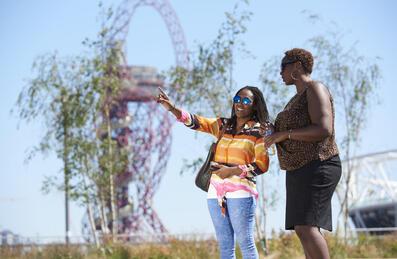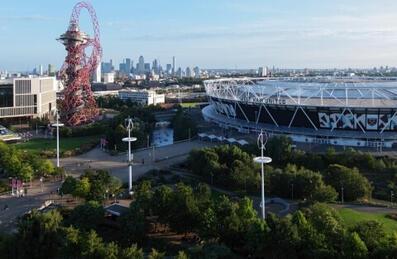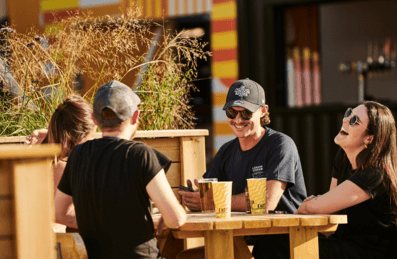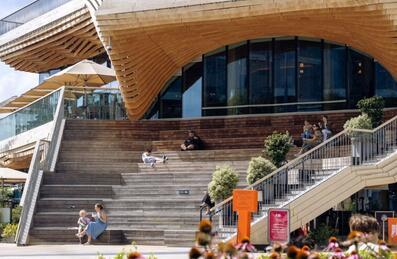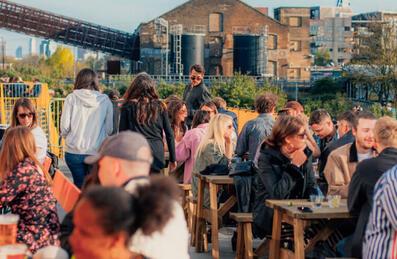
Popular Searches:
Keep up to date
Sign up today for exclusive offers and incredible experiences you won’t want to miss at Queen Elizabeth Olympic Park.
Sign up nowUnderstanding the needs of local communities
Understanding the needs of local communities
Story 27/04/2023
By Catherine Smyth, Head of Development Management at LLDC
Who doesn’t love a bit of public consultation ! Read on…..We’re doing something a bit different at LLDC!
Working as a development management planner for many years, I’m aware of the impact changes can have on a local area, and we always strive to enable appropriate sustainable development, to meet the needs of local people.
I think a lot of people think the planning process starts with a formal application being submitted, but the whole thing starts much earlier than that. There are informal discussions between applicants and planning teams for months, and even longer for large-scale proposals, before plans are submitted for formal decision. From our perspective, that gives time to ensure the development meets the strategic aims of the Development Plan and to consider how the development can ‘give back’ to the community.
It’s also a chance for the plans to be reviewed by experts. Here at LLDC, we have one of the longest-running Quality Review Panels. This panel of built environment professionals - architects, urban designers, town planners, landscape architects, sustainability specialists, heritage specialists and more - help to shape proposals at an early stage by bringing their professional experience to bear on a range of design issues. They provide an invaluable service to help improve the quality of schemes coming forward and are an integral part of the planning process in our area.
But we never stand still….and what we are now doing is inviting those who live, work and visit here and are eager to shape their area, so the people who will be most directly impacted by new development, to share their local experience and views. While community consultation plays a vital role in allowing people to comment when a planning application has been formally submitted, early involvement of local people can make a big difference to the final place being created.
At LLDC we know that people can be concerned, and also excited, about changes and would like to play a more active role in the Planning process. For that reason we, with support from Frame Projects, set up a Community Review Panel at the beginning of this year. This gives people an opportunity to shape a developer’s proposal early on by giving their views and pespectives to developers and the planning team.
LLDC’s isn’t the first CRP but there are only a handful across the country, and most are in London boroughs.
These panels bring project teams into the room with local people and the planning team at an early stage, so at what we call ‘pre-planning’ when the proposals are being firstly devised. This allows local people to understand the detail of a scheme and to have a genuine and practical influence on the design and outcomes.
The role of the panel isn’t to replace wider community consultation that developers would do, such as local exhibtions – but it would complement it, with a more detailed review by people with local knowledge and a feel for the area rather than technical expertise.
So far, the panel of 13 members and Chair, has met three times to review proposals being brought forward by developers. It’s not a legal or Local Plan requirement for developers – who pick up the cost for the process – but it is something we actively encourage for large applications of public significance.
This is no box ticking exercise. The panel members bring an understanding of the local area and can comment from a community perspective with a passion for and lived experience of the area.
The panel’s chair, David Ubaka, is the only professional expert in the group. He is an architect and urban designer with significant experience chairing review panels, including the nearby community review panel on the Isle of Dogs. He is also local, hailing from Leytonstone.
This is a chance for people with invaluable local knowledge to bring that to bear on how their area is developed. While the panellists are not professional architects or town planners, and don’t have an in-depth knowledge of the planning system; they do bring a very human understanding of how the area works and functions: what people value and what it is like to live here.
They’ve been thrown in at the deep end with some significant developments to review. But they are not without plenty of support. Our planning team is on hand to advise and answer questions and we provide training to give an overview of issues like planning policy, design matters, sustainability, accessibility, safety of women and girls and much more besides.
Those first three meetings have been informative and insightful, and they will no doubt be influential on what type of development eventually gets built. The process bodes well for the future of the CRP and the panellists’ ability to shape how the area evolves in the years ahead.


